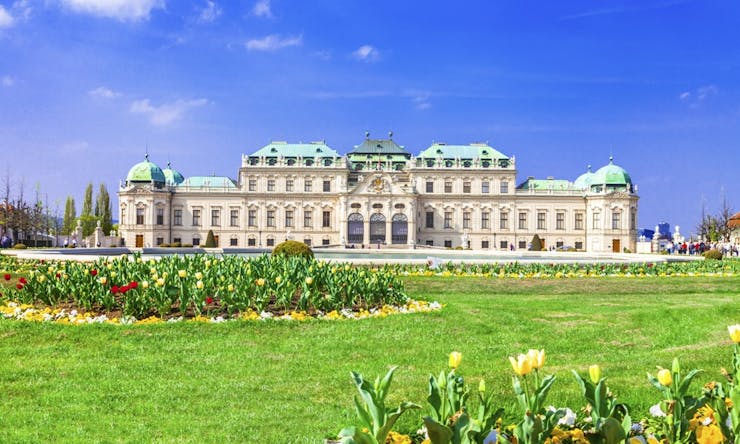For those who want to legally grow huge amounts of cannabis in Austria, business is booming — but not yet blooming.
The Austrian Narcotics Act prohibits the cultivation of cannabis only for the purpose of obtaining narcotics, and THC can be obtained only from cannabis flower. But if you promise your intent isn’t for consumption or sale, and swear you won't let the plants flower, you can buy truckloads of clones. More than 250,000 clones are sold annually in the capital city of Vienna alone.
The trade has made Austria, home of Mozart, chocolate cake Sachertorte, and deep-fried schnitzel, home to Europe's only cannabis clone superstores. They attract locals and foreigners alike. In most European Union countries, cannabis seeds are legal and home growing is the name of the game. But Germany and Switzerland don’t allow the sale of cannabis seeds. So growers in these countries simply visit neighboring Austria, where not just seeds but cannabis cuttings are legal.
In Vienna, where the first cannabis growers opened their greenhouses more than a decade ago, sales by major vendors already surpass seven-digit figures. And numerous smaller vendors specialize in niche offerings, such as organic cuttings or breeding female seedlings from feminized seeds.
A Visit to “Hemp & Hemp”
When strolling through the storied cobblestone streets of Vienna, you may pass by Hanf & Hanf, one of Vienna's premier clone shops. You’ll know you’re near when you catch a whiff of the sweet smell of freshly trimmed mother plants. And luckily, despite being home to many pungent garden centers, in Vienna there is no “Nasal Ranger” patrolling the streets like there is in Denver.
Strains prized in the U.S., like Bubble Gum, Cheese, Shiva Skunk, Herijuana or White Satin, exude their specific aromas, hinting at what’s to come once the baby plants are allowed to mature at home. But remember, the intention must remain pure — no abuse of narcotics.
In Europe's “clone capital,” LED lights ensure short internodes on the seedlings, making the clones suitable for the Sea of Green growing method popular in large-scale cultivation operations. Outdoor strains and fully stocked growboxes are widely available. The staff at Hanf & Hanf has nearly 20 gardeners who grow cannabis legally in a facility thousands of square feet in size. The greenhouse extends over two floors in a contorted building behind the store. It’s home to a maze of mother, grow root, pre-grow, and fog rooms where more than 80 carefully selected varieties of the continent's leading breeds are cultivated.
If visiting Vienna, come for a weekend. Once a month, it's "Green Friday,” with special discounts on all cuttings. Business is so strong that Than Drazen, founder of Hanf & Hanf and an Austrian cannabis pioneer, sometimes has to lock the shop door despite long lines of people waiting on the sidewalk for clones. Sometimes vans with foreign license plates pull up to buy clones en masse.
A few subway stops away, you can even find flowering plants under artificial light in the Hemp Embassy. Stivi Wolyniec, owner of cannabis cultivation superstore Growcity, founded the Hemp Museum's Club last year, which operates the Hemp Embassy in Vienna's Esterhazygasse.
Austria is Simply Peculiar
Besides allowing clones but prohibiting the intent to consume, the country’s Narcotic Substances Act also defines when allowing your plants to flower is allowed. If the buds aren’t destined for consumption, cannabinoid extraction, or sale, the blooming plants are — at least theoretically — still legal by the letter of the law. That interpretation of the rules allows the Hemp Embassy to showcase lovely flowering cannabis plants sealed behind glass.
“It is not forbidden to possess or exhibit hemp flowers,” Wolyniec said of the Hemp Embassy's permanent exhibition. “It's about the purpose behind it. If the purpose is abuse, then both the growing and the flowering plant are prohibited. If the purpose is not abuse, but another — in our case an exhibition — cannabis buds are legal.”
But all good things must come to an end. Once the plants on exhibition lose their luster, they’re destroyed in an incinerator under a notary’s watchful eye.
The legal cannabis-clones business has spread across Austria. Only in the most conservative parts — such as Salzburg and Tirol in the Alps — does the justice system sporadically prosecute openings of so-called hemp greenhouses, as the stores are called in Austria. But only operators of really large, obviously commercial operations are punished with prison sentences — small-time growers usually face court hearings and probationary punishments.








